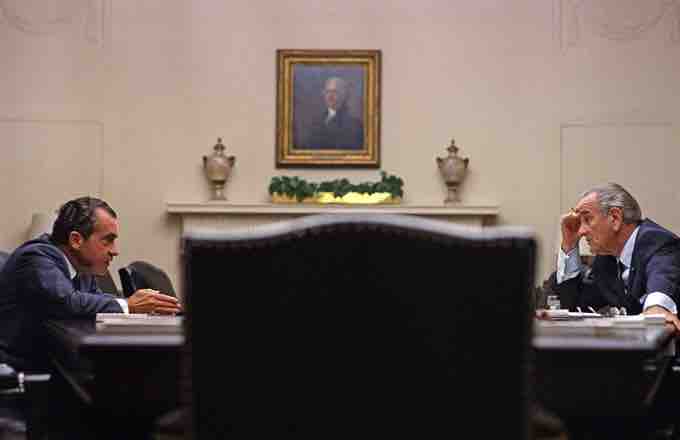Nixon Becomes President
Richard Milhous Nixon was elected president in the election of 1968, narrowly beating the incumbent vice president, Hubert Humphrey. Nixon became only the second Republican President elected since 1932. He was inaugurated on January 20, 1969, sworn in by his former political rival, Chief Justice Earl Warren. In his inaugural address, which received almost uniformly positive reviews, Nixon remarked that "the greatest honor history can bestow is the title of peacemaker"—a phrase that would later be placed on his gravestone. He pledged an end to partisan acrimony and a new era of unity:
In these difficult years, America has suffered from a fever of words; from inflated rhetoric that promises more than it can deliver; from angry rhetoric that fans discontents into hatreds; from bombastic rhetoric that postures instead of persuading. We cannot learn from one another until we stop shouting at one another, until we speak quietly enough so that our words can be heard as well as our voices.
In 1972, Nixon was reelected, defeating Democratic senator George McGovern in a landslide victory. Emphasizing a stable economy and his successes in foreign affairs, Nixon won 60.7% of the popular vote, only slightly lower than Lyndon B. Johnson in 1964. However, Nixon resigned before the end of his term on August 9, 1974 amidst a scandal that came to be known as Watergate. On June 17, Nixon was implicated in the burglary of the Democratic National Committee (DNC) headquarters at the Watergate complex, and he became the only president in American history to resign.
Nixon was popular among voters in the South, Southwest, and northern suburbs as he appealed to their anxieties about civil rights, women’s rights, antiwar protests, and the counterculture taking place around them. Nixon spent his first term in office pushing measures that slowed the progress of civil rights and sought to restore economic stability. His greatest triumphs were in foreign policy, but his largest priority throughout his first term was his reelection in 1972.
Nixon's Foreign Policy
Nixon achieved some successes in the realm of foreign policy. Assisted by Henry Kissinger (initially Nixon's National Security Advisor and later his Secretary of State), Nixon initiated diplomatic relations with China and made a well-received and productive visit to China in February of 1972. The visit ushered in a new era of U.S.-Chinese relations. Fearing the possibility of a U.S.-Chinese alliance, the Soviet Union yielded to pressure for détente with the United States.
Nixon had pledged to end America's military involvement in Vietnam, which had been greatly escalated by his predecessor President Johnson. Nixon's strategy included a secret bombing campaign of North Vietnamese positions in Cambodia, coupled with what was termed as "Vietnamization" of the war—replacing American troops with Vietnamese troops. Nixon signed the Paris Peace Accords in 1975, allowing for the withdrawal of remaining American troops. North Vietnam conquered South Vietnam in 1975.

Nixon Meets with President Johnson, 1968
President Nixon inheriting a mixed legacy from President Johnson, including the unpopular Vietnam War and the ambitious Great Society programs.
The Nixon administration also improved diplomatic relations with the USSR. In successful summits, Nixon and Brezhnev proclaimed a new era of "peaceful coexistence." The USSR and the United States agreed to arms reduction treaties, and USSR limited its support of North Vietnam.
Nixon's Domestic Policies
In domestic policy, Nixon advocated a New Federalism, which would devolve power to state and local elected officials. Congress, however, was hostile to these ideas and enacted few of them. During this era, Nixon contended with budget deficits and high inflation. He made controlling inflation a priority, experimenting with price controls with mixed success. Nixon also sparred with democratic senators over national health insurance. On civil rights, Nixon sought to find a politically popular solution to the school integration issue, though he could not avert widespread anti-bussing riots around the country. Nixon also implemented the Philadelphia Plan, the nation's first affirmative action legislation, in 1970.